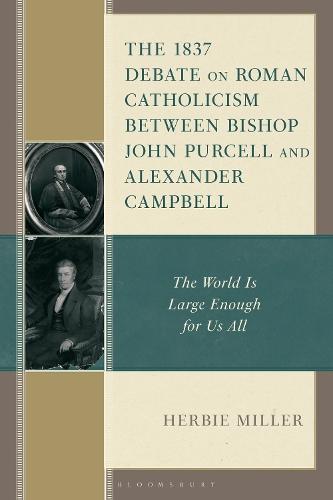Full Product Details
Author: Dr. Herbie Miller
Publisher: Bloomsbury Publishing Plc
Imprint: Lexington Books/Fortress Academic
Dimensions:
Width: 15.20cm
, Height: 2.50cm
, Length: 22.90cm
Weight: 0.454kg
ISBN: 9781978715967
ISBN 10: 197871596
Pages: 216
Publication Date: 27 November 2025
Audience:
Professional and scholarly
,
Professional & Vocational
Format: Hardback
Publisher's Status: Forthcoming
Availability: Manufactured on demand

Reviews
As reference to the Lincoln-Douglas debates indicates, nineteenth-century America witnessed many public occasions where antagonists told audiences why they were right and their opponents were wrong. In the religious sphere none of these occasions were more consequential than the debate between the feisty Protestant Alexander Campbell and the Catholic Bishop John Purcell that took place in Cincinnati over eight days in January 1837. Herbie Miller's well-researched study tells us not only who Campbell and Purcell were, why they were important, and how they developed their arguments, but why their spirited and often contentious exchanges also displayed a surprising degree of charitable good will. Their world, unlike much contention between antagonists in our day, was indeed large enough for both of them. * Mark Noll, McAnaney Professor of History Emeritus, University of Notre Dame, USA * In this fascinating account of the only oral debate in American history between a Protestant minister and a sitting Catholic bishop, Herbie Miller highlights how – despite their significant theological differences, and despite the fact that the debate took place at a time of raging anti-Catholicism – Alexander Campbell and Bishop John Purcell engaged in civil and respectful dialogue (and, in fact, became lifelong friends). As we endure our own moment of cultural warfare and extreme polarization, Miller’s winsome book points us to what productive interreligious dialogue could look like. May we heed this example. * William Trollinger, Professor, University of Dayton, USA * In March 1836, Rev. Alexander Campbell, a founder of the Disciples of Christ and a key figure in the Second Great Awakening, published a challenge to any Catholic willing to debate him on the truth of papal claims. On a cold January 13 in 1837, Bishop John B. Purcell of Cincinnati answered Campbell’s challenge and met him at Sycamore Street Meeting House in the heart of Cincinnati. In telling the little-known story of their eight-day debate, Herbie Miller makes a timely and instructive contribution. Though they reached no agreement, Campbell and Purcell successfully negotiated their deep religious and cultural divisions. Outliers in the U.S. Protestant mainstream, each achieved a certain degree of legitimation, but more surprisingly, mutual respect, and lifelong friendship. Miller offers their story to a fractured time as witness to the possibility of civil public debate. * William L. Portier, Professor Emeritus, University of Dayton, USA *
As reference to the Lincoln-Douglas debates indicates, nineteenth-century America witnessed many public occasions where antagonists told audiences why they were right and their opponents were wrong. In the religious sphere none of these occasions were more consequential than the debate between the feisty Protestant Alexander Campbell and the Catholic Bishop John Purcell that took place in Cincinnati over eight days in January 1837. Herbie Miller's well-researched study tells us not only who Campbell and Purcell were, why they were important, and how they developed their arguments, but why their spirited and often contentious exchanges also displayed a surprising degree of charitable good will. Their world, unlike much contention between antagonists in our day, was indeed large enough for both of them. * Mark Noll, McAnaney Professor of History Emeritus, University of Notre Dame, USA * In this fascinating account of the only oral debate in American history between a Protestant minister and a sitting Catholic bishop, Herbie Miller highlights how – despite their significant theological differences, and despite the fact that the debate took place at a time of raging anti-Catholicism – Alexander Campbell and Bishop John Purcell engaged in civil and respectful dialogue (and, in fact, became lifelong friends). As we endure our own moment of cultural warfare and extreme polarization, Miller’s winsome book points us to what productive interreligious dialogue could look like. May we heed this example. * William Trollinger, Professor, University of Dayton, USA * In March 1836, Rev. Alexander Campbell, a founder of the Disciples of Christ and a key figure in the Second Great Awakening, published a challenge to any Catholic willing to debate him on the truth of papal claims. On a cold January 13 in 1837, Bishop John B. Purcell of Cincinnati answered Campbell’s challenge and met him at Sycamore Street Meeting House in the heart of Cincinnati. In telling the little-known story of their six-day debate, Herbie Miller makes a timely and instructive contribution. Though they reached no agreement, Campbell and Purcell successfully negotiated their deep religious and cultural divisions. Outliers in the U.S. Protestant mainstream, each achieved a certain degree of legitimation, but more surprisingly, mutual respect, and lifelong friendship. Miller offers their story to a fractured time as witness to the possibility of civil public debate. * William L. Portier, Professor Emeritus, University of Dayton, USA *
Author Information
Herbie Miller is Senior Pastor of Palmetto Presbyterian Church in Mt. Pleasant, SC, USA.



